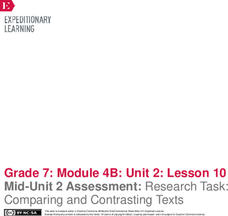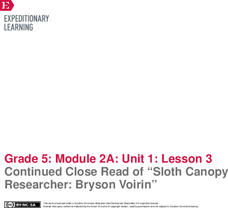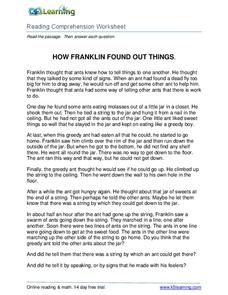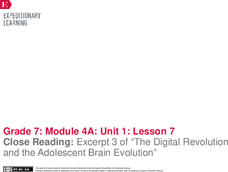National Museum of the American Indian
The A:Shiwi (Zuni) People: A Study in Environment, Adaptation, and Agricultural Practices
Discover the connection of native peoples to their natural world, including cultural and agricultural practices, by studying the Zuni people of the American Southwest. This instructional activity includes examining a poster's...
K5 Learning
Changes
You can't unring a bell, but can you unmelt an ice cube? Readers consider reversible and irreversible changes with a short informational reading passage and accompanying comprehension questions.
EngageNY
Close Reading: Excerpt 5 of “The Digital Revolution and the Adolescent Brain Evolution”
Class members consider how technology affects social interactions as they continue reading an article about the digital revolution and adolescent brain development. Then, working in pairs, scholars answer text-dependent questions and...
EngageNY
Mid-Unit 2 Assessment: Research Task: Comparing and Contrasting Texts
It's the half-way mark! Pupils demonstrate understanding of unit standards by completing a mid-unit assessment. After reading an informational article about water management strategies, scholars complete a graphic organizer to identify...
EngageNY
End of Unit Assessment: Text-Dependent Questions and Draft Editorial: The Mary River Project on Baffin Island
Scholars complete an assessment, read an informational article, and answer text-based questions. Also, pupils use the Painted Essay technique to write a draft editorial about a topic they studied throughout the unit, the Mary River Mine...
EngageNY
Continued Close Read of “Sloth Canopy Researcher: Bryson Voirin”
Let's explore the rainforest by studying its inhabitants. Pupils continue reading an interview with a sloth scientist and answer text-dependent questions. Next, they engage in a class discussion to share the new facts they learned about...
EngageNY
Mid-Unit Assessment: Analyzing an Author’s Argument and Text Structure
William Shakespeare: a writer, a poet, a fake? For their mid-unit assessments, scholars read an excerpt from the article "The Top Ten Reasons Shakespeare Did Not Write Shakespeare" by Keir Cutler. Next, they analyze the author's argument...
K12 Reader
The Scientific Method
Introduce the scientific method with a reading comprehension activity. Have kids read a few paragraphs that describe the process of making a hypothesis, gathering evidence, and taking notes that will support the experiment.
EngageNY
Conducting Research: Analyzing Text from the Qikiqtani Inuit Association (QIA)
Scholars read excerpts from the Qikiqtani Inuit Association website as they begin researching their case studies on the Mary River Project. They read an article to build background knowledge and analyze key vocabulary words using the...
K12 Reader
Plant Life Cycles
Plant life cycles are the focus of a life science worksheet that is designed as a reading comprehension exercise. Readers respond to five questions based on the passage.
K5 Learning
How Franklin Found Out Things
Franklin learns about the world by making observations, and so do we! A short reading assignment prompts fourth graders to answer comprehension questions about a curious boy and what he notices.
EngageNY
Comparing Text to Multimedia: Understanding How the Brain Changes
Learners explore how the human brain changes over time, comparing an interactive web page about brain development to a text-only version. Additionally, pupils continue reading an article about teen decision making, analyzing the main...
Core Knowledge Foundation
Columbus and the Pilgrims Tell It Again!™ Read-Aloud Anthology
A read-aloud anthology focuses on Columbus and the pilgrims. Young scholars listen to several stories covering Christopher Columbus, the Mayflower, Plymouth Rock, pilgrims, meeting Native Americans, and the first Thanksgiving. Nine...
Curated OER
Grade A: The Market for a Yale Woman's Eggs by Jessica Cohen
What would it be like to sell your eggs to a couple who can't have children on their own? Could you even imagine it? As most of us have never been in this position, this descriptive essay is really quite interesting. The reading itself...
Richmond
Chinese New Year – Reading Comprehension
Traditions surrounding the celebration of the Chinese New Year are the focus of a reading comprehension worksheet designed for intermediate level language learners.
EngageNY
Close Reading: Excerpt 3 of “The Digital Revolution and the Adolescent Brain Evolution”
It's time to level up and discover how video games affect the brain. Pupils explore the topic as they continue reading excerpts from an article about adolescent brain development and the digital revolution. Scholars also participate in a...
EngageNY
Reading an Interview: “Sloth Canopy Researcher: Bryson Voirin”
It's time to slow down and learn about sloths! Scholars read the first few questions of an interview with a sloth canopy researcher, looking for the gist. Next, they create a glossary in the back of their journals to add new scientific...
EngageNY
Comparing Meaning and Tone: The Fall of Saigon in Fiction and Informational Text
Who's that talking to? Readers listen to a reading of the "Forgotten Ship" transcript and answer questions focusing on word meaning and choice. They complete a chart to track the multiple narrators in the script. For homework, readers...
Polk Bros Foundation
I Can Identify a Nonfiction Writer's Main Idea and Supporting Examples
Use this page to quickly identify the central idea of a text and organize ideas for writing an informational or explanatory text. The worksheet is split into two parts. In the first part, pupils note down the main idea and supporting...
Mr. Nussbaum
Money
Young readers test their comprehension skills with an interactive practice. Pupils read a brief informational text about money then answer five questions. A detailed page appears at the end to showcase participants' work.
EngageNY
Continued Close Reading of Rain School: Text-Dependent Questions and Vocabulary
The engaging story Rain School is further explored in the third lesson of a larger unit that explicitly teaches close reading skills by answering questions whose answers can only be found inside the text. Through teacher modeling and...
EngageNY
Documenting Research: Sorting and Recording Information About the Wheelwright
Fourth graders practice using a graphic organizer to record their notes and answer text-dependent questions while supplying evidence of how they found their answer. They focus on a machine called the wheelright, which was commonly used...
EngageNY
Mid-Unit 2 Assessment: On-Demand Informational Writing
Lesson 7 focuses on building academic vocabulary and writing an explanatory letter with supported textual evidence. For the first five minutes of the instructional activity, the educator reminds the class of how to read and refer to the...
Federal Reserve Bank
Credit Reports—and You Thought Your Report Card Was Important
Get the facts about credit and take a close look at what factors into a consumer credit report with this fantastic lesson. Your pupils will read informational texts, read sample financial documents, and discuss the advantages and...

























